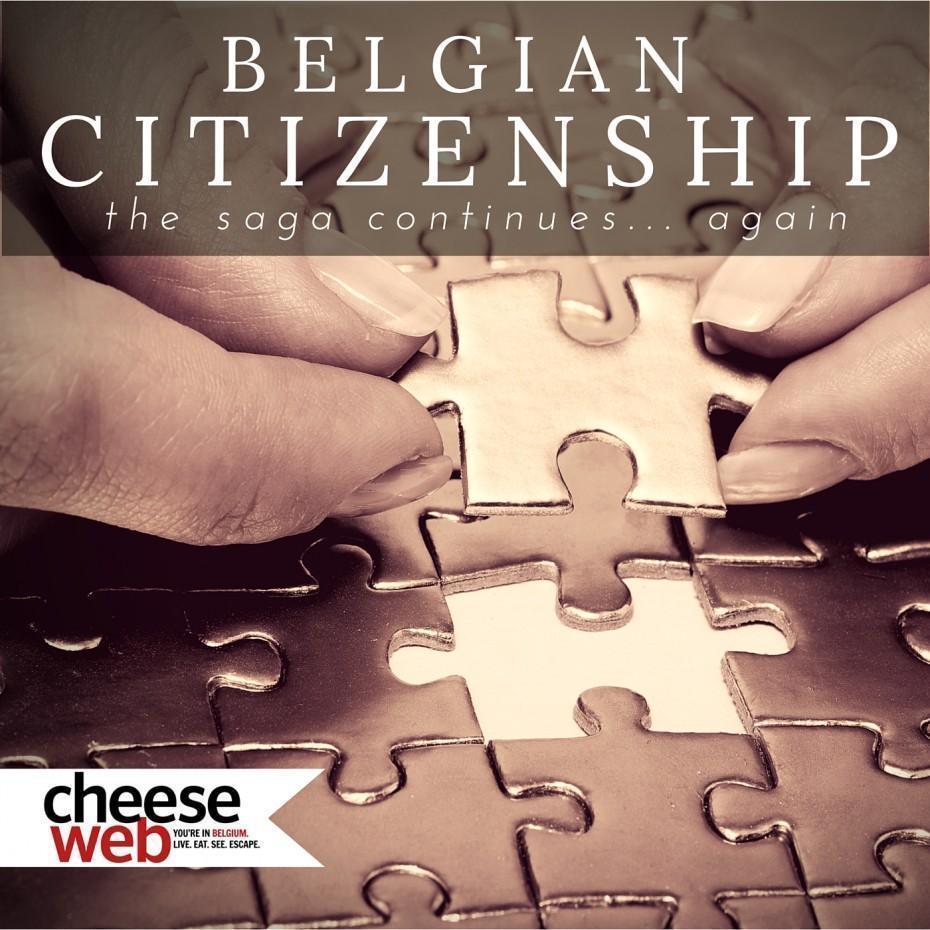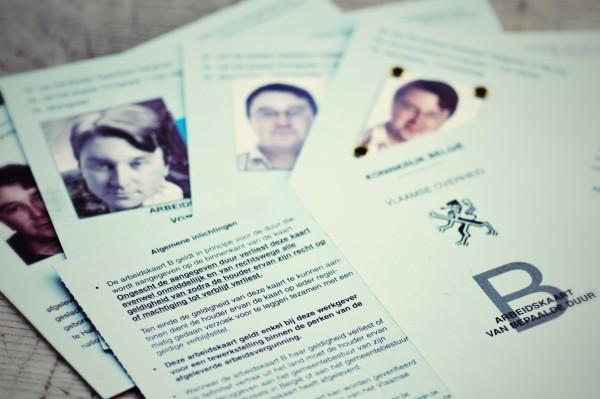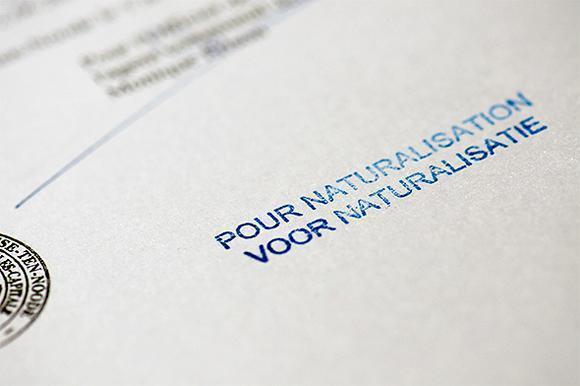
We first applied for citizenship in late 2012, ahead of changes planned for January 2013. At the time, an immigrant residing in Belgium for seven consecutive years could automatically become a Belgian citizen. From 2013 onwards, applicants needed to meet new requirements, such as proof of social or economic integration.
Long story short, Alison was accepted and I was rejected. (Cue sad music.) I appealed the decision but had no information on the appeal’s status beyond it being a ‘one to two year process.’ Nevertheless, we celebrated Alison’s success and awaited word on my appeal.
One year later, having heard nothing about my appeal, I returned to the commune for an update. “We have no information, nor any way to get information,” the staff told me. Appeals are sent to the Justice department and are out of the hands of the commune. I asked if there was anything else I could do. “Well, you could reapply.” Ah hah! A clue!
It seemed odd to reapply while under appeal, but who am I to argue? The staff walked me through which of the new rules (Article 12bis) applied to me. I had to meet the following requirements:
- Have lived in Belgium for at least five years;
- Provide a Certificate of Birth (translated, with apostille);
- Provide a copy of both sides of my Belgian Identity Card;
- Provide a record of my residency (supplied by the commune);
- Demonstrate economic integration by providing a ‘comptes individuelle’ showing I worked at least 468 days in the last five years; and
- Pay 150 euros cash
Pretty straightforward, right? For most people, it is. But not for me.
The fifth bullet point, economic integration, is a problem. If you work on a Belgian contract, you simply ask your payroll company to provide a ‘comptes individuelle,’ which lists the days you worked in the last 5 years. Easy. But…
Although I’ve worked here since 2005, I was employed in Canada but transferred to Belgium. Therefore, my payroll was in Canada, not in Belgium. Thus, no ‘comptes individuelle.’ Nothing is ever easy.

Plenty of Belgian work permits… but will these help?
I left the commune wondering what I could do about this gap in my documentation. I spoke with a few people and decided to offer the government whatever documents I had. The point is to demonstrate I worked 468 days in the last 5 years. So I gathered up 5 years of Canadian pay details and Belgian tax declarations. Then I headed back to the commune.
I described my situation to the staff who called in their superior. I re-explained the situation and showed her the documents. She looked them over and told me she had no idea if they would be accepted or not. “Well, should I apply anyway?” I asked. “You can, but if they don’t accept it, you’ll have paid 150 euros for nothing.” “But do I have a choice?”
She paused and thought for a minute. Then she said something I didn’t expect, “Let me take these, send a note to the citizenship department, and see what they recommend.” I’ll be honest, I was floored. I immediately accepted the offer and gave her my phone number to call when she heard back.
This was in May. Time went on and I heard nothing from her. I started visiting the commune every few weeks just to check. There was still no answer on the query, but she would ask again for an update. Finally, in late September, while visiting Canada, I got a voice mail. “I heard back from the citizenship department. They do not provide consulting. The only way to find out is to make an application.”
Four months to learn that I should have just applied! Sigh.
So a couple weeks ago, I gathered up my files again and headed back to the commune. As you can expect, by now I am on a first name basis with the team at the state desk. I greeted everyone and summarized where things stood. Apparently, the supervisor I had dealt with was no longer there so I needed to explain the situation again.
The new supervisor seemed to grasp the issue and he agreed there was nothing else I could really provide to demonstrate my employment. However, he cautioned me the citizenship department might still refuse my application, since it doesn’t have the proper documents. The risk was waiting another 4+ months and losing 150 euros.
He then began to explain the appeal process. I interrupted to say I was already in the appeal process for a previous application. He looked at me with a face that said ‘you poor bastard.’
“When did you apply?” “December, 2012,” I answered. “Under the old rules, I guess. Why was it refused?” “Une petit souci… a small discrepancy… I have a one month gap in 2007.”
He dug out my file, looked through it and swore softly to himself. He shook his head and said, “They shouldn’t have refused this. You included a covering letter… and you included your flight ticket. They didn’t even look this far in the application.”
To me, it is both funny and odd to get this reaction at the commune. We’ve met so many people who didn’t care (e.g. the woman in Kortenberg who refused to renew my residence card because it hadn’t expired), but this guy seemed to have some real empathy for my situation. I hope he will hold on to it and he doesn’t burn out over his career.
“Well, your current application is complicated, but not the most complicated one we’ve dealt with. As far as the documents go, they prove to me you are working and you should be approved. However, I am not able to tell you what the citizenship department will say. So the decision is yours… 150 euros to apply.”
Of course, I opted to apply. As I told him, I waited 5 months to hear about my documents, in which time I could have heard about the application itself. There was no other way to find out. I haul out 150 euros to pay him.
“Oh no… you don’t pay here. You have to go to another office to pay. It’s over by Avenue Louise.”
“So I pay them and make the application there?” I ask.
“No, you just pay them, they give you a receipt, you bring the receipt here, and then I can take your application.”
I look at him, perplexed.
“Yes, I know,” he said. “I don’t understand why you need to pay there, but that is the process. Oh and they close at 12, so you have half an hour.”
Yes, Kafka is laughing in his grave.

Paperwork is a fact of life in Belgium
I jump on the Metro to go to Louise, walk 5 minutes, proceed to the 5th floor and go to the booth at office 7. I ring the bell. A woman arrives and I tell her I want to pay the fee for registering my application. She asks for 150 euros and my identity card. She takes these to her desk and brings up my file on her computer (note: any gov’t department can do the same thing). She prints out a form, signs it, embosses it (very important), stamps it, then files it. She walks over to another line of open books on top of a table. She manually notes my identity card and payment in no less than 3 different books! Finally, she fills out a receipt (by hand, of course), embosses it, stamps it, and signs it. She comes back to the window and hands me the receipt and my identity card.
“Is there anything else?” I ask.
“No.”
Ummmm ok… back to the commune I go. I walk in and the supervisor greets me. We review the file once more. He says, “There isn’t much I can do to help this along. Since you don’t have the proper documents, I’m supposed to include a particular form in the application. However, what I can do is omit that form. I’ll need you to sign the form for our own file, but I won’t include it in the final application. It’s a small thing, but I hope it will make them focus on what you have provided rather than what you have not.”
Again, I was taken aback by his helpfulness. Why aren’t there more of these types of people working in the government?
“So, the fee is 25 euros.”
“Uhhhh…”
“The fee for registering the application is 150 euros, which you’ve paid, but there is another 25 euro fee for the commune. I know. I don’t understand why they couldn’t consolidate the two fees, but that’s the way it is.”
The cost of applying has gone from 45 euros two years ago to 175 euros today. That’s quite the inflation!
Fee paid. Application submitted. Hurrah!
Now I can only wait. The citizenship department has four months to review the application and provide their advice (positive or negative). If I hear nothing in 4 months, I become a citizen.
Meanwhile, I could be called to court, at any time, to appeal my first application. However, I’ve recently learned that the Justice department could take 1, 2, 3, or 4 (!) years before my appeal is heard. Good thing I’m not waiting on that!
For anyone navigating process in Belgium or any other country, I hope the above made you laugh in a few places or you saw yourselves in it somewhere. Although my experience is with Belgium, this sort of situation is not unique to Belgium. There are plenty of hurdles to jump in any government process.
Below I’ve included a couple of short videos which are definitely worth watching. A Belgian (thanks, Marc!) shared the first on with me. It features Asterix and Obelix navigating Roman bureaucracy. This is how I feel every time I interact with government offices.
Asterix & Obelix: The place that sends you mad – Video Link
The second video comes from our American friends carving out a life for themselves in Spain (thanks, Warren and Betsy!). This video features a woman who is determined to beat the system. It gives me hope!
036 – Video Link
Thanks for reading this far… it’s a long story and it’s not over yet. If you are navigating a bureaucratic process, my only advice is to be patient. Treat it like a game. Every event, paper, or conversation reveals a new clue for you to puzzle over.
What’s your story? I’d love to hear about it and how you manage the frustration. Share your experience in the comments below or drop me a note via our contact page.
Looking for more resources for living in Belgium? Check out our Expat Resources page.
- Wise Review: How to Save Money on International Currency Transfers - January 20, 2017
- Our 50+ Best Belgium Gifts Online - November 29, 2016
- Review: Crowne Plaza – Le Palace Hotel and Restaurant, Brussels, Belgium - September 30, 2016
- Applying for Belgian Citizenship – Eventually
- Getting Belgian Nationality – the Continuing Saga
- Applying for Belgian Citizenship – Again

